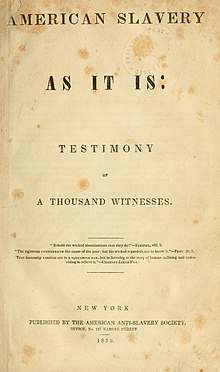American Slavery as It Is
American Slavery as It Is: Testimony of a Thousand Witnesses is a book written by the American abolitionist Theodore Dwight Weld, his wife Angelina Grimké, and her sister Sarah Grimké, which was published in 1839.[1][2]
 | |
| Authors | Theodore Dwight Weld, Angelina and Sarah Grimké |
|---|---|
| Original title | American Slavery As It Is: Testimony of a Thousand Witnesses |
| Country | United States |
| Language | English |
| Subject | Slavery and emancipation |
| Published | American Anti-Slavery Society |
A key figure in the abolitionist movement, Weld was a white New Englander. His wife, Angelina, and sister-in-law Sarah, were from a Southern slave-owning family; both women were active in the abolitionist and women's suffrage movements. Together they composed this book using many first-hand accounts of slavery and its horrors. The work focuses on the afflictions that slaves faced, covering their diet, clothing, housing, and working conditions. The authors also discussed and refuted several pro-slavery arguments. American Slavery as It Is: Testimony of a Thousand Witnesses was distributed by the American Anti-Slavery Society, and was very influential in the formative days of the abolitionist movement.
Harriet Beecher Stowe used American Slavery as It Is as the direct inspiration for her novel, Uncle Tom's Cabin, which also became very influential in the movement to end slavery. Stowe went so far as to reportedly sleep with the book "under her pillow at night."[3] Within the first year of publication, the book had sold 100,000 copies; it served as a vital combination of testimony from those affected by slavery and advertisements published by slavers themselves.[3] This method proved effective at gaining support for abolitionism, since slave-owners could not dispute their own words no matter how poorly it reflected on their character.
Other works inspired in part by American Slavery as It Is included William Goodell's The American Slave Code in Theory and Practice, and Charles Dickens' American Notes quotes whole ads from Weld and the Grimké sister's book.[3] Frederick Douglass quoted from the book when giving speeches, and said that "not a single fact or statement recorded therein has ever been called in question by a single slave holder."[4]
See also
References
- Weld, Theodore Dwight. "American Slavery as It Is: Testimony of a Thousand Witnesses (Electronic Edition)". Documenting the American South. Retrieved 2013-07-05.
- Monique Prince. "Theodore Dwight Weld, 1803-1895". Documenting the American South. Retrieved 2013-07-05.
- Garvey, Ellen (January 25, 2013). ""facts and FACTS": Abolitionists' Database Innovations". In Gitelman, Lisa (ed.). "Raw Data" Is an Oxymoron. MIT Press. pp. 89–102. ISBN 978-0-262-51828-4.
- Douglass, Frederick (May 22, 1846). American Slavery, American Religion, and the Free Church of Scotland: An Address Delivered in London, England, on May 22, 1846 (Speech). New Haven: Yale University Press. Retrieved November 19, 2018.
External links
- 1839 original edition of the book
- American Slavery as It Is, available at Internet Archive.
- American Slavery as It Is, available at Google Books.
- American Slavery as It Is, available through University of North Carolina at Chapel Hill.
- Abridged modern edition, with 14-page introduction:
- Weld, Theodore (1972). Curry, Richard Orr; Cowden, Joanna Dunlap (eds.). Slavery in America : Theodore Weld's American slavery as it is. Itasca, Illinois: F. E. Peacock.
- Theodore Dwight Weld (1803-1895), biography by Worcester Women's History Project.